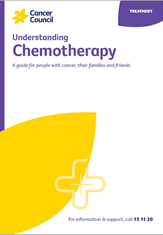Chemotherapy
Chemotherapy uses a range of drugs to treat cancer. If you are having chemotherapy, this information will help you understand how it works, what to expect during and after treatment, and how to manage side effects.

Download PDF
For your community
Print these questions
Treatment
- Why do I need chemotherapy?
- What are the advantages and disadvantages of chemotherapy for me?
- How successful is chemotherapy for the type of cancer I have?
- What is the goal of this chemotherapy?
- Are there any other treatments I can have instead?
- Will I have other treatments as well as chemotherapy?
- How much does treatment cost?
- What drugs will I be receiving? How will they be given?
- How often will I receive chemotherapy and for how long?
- How will you decide the dosage?
- Are there clinical guidelines you are following?
- How will I know if the treatment is working?
- Where will I have treatment? Can I have it close to where I live or at home?
- Do my family and friends need to follow any safety measures?
- Can I take my usual medicines during chemotherapy?
Side effects
- What are the risks and possible side effects of this type of chemotherapy?
- Will the side effects be long term or short term?
- What can I do to help manage any side effects?
- Will chemotherapy affect my sex life and fertility?
- Are there any complementary therapies that might help me?
- Should I change my diet or physical activity during or after treatment?
- Who should I contact for information or if I have a problem during treatment? Who is my after-hours contact?
After treatment
- How often will I need check-ups after treatment?
- Am I at risk of developing late effects from chemotherapy? What might these be? What can I do to prevent this?
Chemotherapy is the most common type of drug treatment for cancer. We have separate information on other cancer drug treatments. Read about immunotherapy, targeted therapy and hormone therapy.
Find information on chemotherapy in nine different languages, including Chinese, Arabic, Vietnamese, Greek and more.
Need to talk?
Call 13 11 20 to talk to a health professional Or email us your questions.